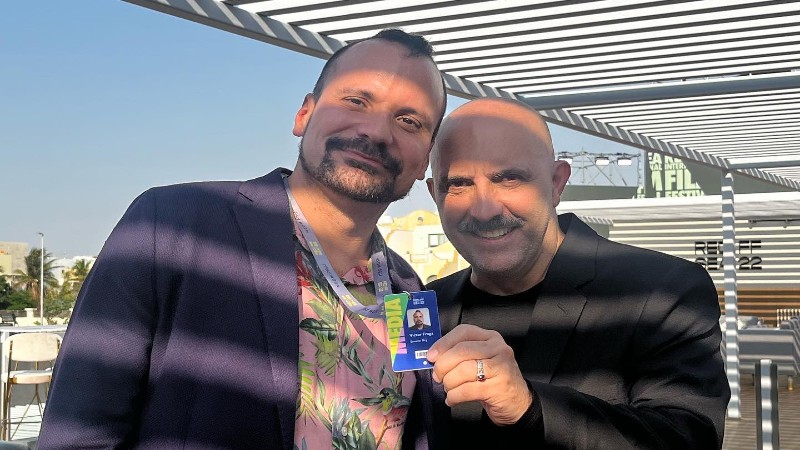




Enfant terrible, pornographer, subversive genius, provocateur. These are some of the accolades that have been bestowed upon the Argentinean-born filmmaker, who moved to France aged 13. The director is best remembered for his deeply provocative and often sexually explicit films Irreversible (2002), Love (2015), Climax (2018), Lux Aeterna (2019). His new film Vortex (2021) is a far dirtier movie, instead focussing on the more universal and accessible topic of dementia (featuring octogenarian Italian filmmaker Dario Argento in the lead).
Victor Fraga briefly sat down with Gaspar at the 2nd Red Sea International Film Festival. The event takes place between December 1st and 20th in Jeddah, Saudi Arabia.
…
.
Victor Fraga – You are a deeply subversive director. How does it feel to be here in Saudi Arabia, of all places. Were you surprised by the invitation?
Gaspar Noé – The idea of doing this Festival started three years ago, and then because of Covid they had to postpone for a year. They are rescheduling the future of this country [laughs]. Of course I was surprised when I received the invitation. I just got invited Vortex was part of the programme last year because it’s a general audience movie. It deals with a very universal subject: old age and dementia. Everybody has someone in their family who’s old and demented. You can be rich, and can be poor, you can be Saudi, Brazilian or British. Old age is everywhere, and the issues are the same.
I was invited to attend the Red Sea Film festival last year, but I couldn’t come because I had to see my father in Buenos, and that’s the opposite side of the planet. I’m so happy that they reinvited me this year, just just for a masterclass! I hope this festival will push many locals to doing film. I’d love to see more films from countries that have not been so productive
VF – How did audiences react to Vortex?
GN – I wasn’t here last year when they showed it, but I don’t think people were shocked. Either they cry or they don’t cry. Or they come out of the cinema in a bad mood [laughs out loud].
VF – Do you think you could eventually show films like Irreversible, Love or Climax here in Saudi Arabia?
GN – No! But, you know, nowadays when people want to do something they just go on the Internet, where all sorts of films can be found illegally. So, if anyone wants to see my body of work, they will find a clever way to way to watch it, be they in Saudi Arabia or anywhere else. Censorship used to work five decades because you could only show a movie on a big screen, with a 35mm print. or on television. And you could control cinema and television. But nowadays with the Internet is a permanent flow of images coming from every country in the world. You can not fight against the new technologies. You should ride them instead.

VF – Have Arab cinema, or Arab culture more broadly influenced you and your work?
GN – The first Arab movie that really impressed me was directed by an Italian filmmaker. It was The Battle of Algiers [Gillo Ponecorvo, 1966]. Lately I have been watching a lot of Iranian movies. There are so many masterpieces. You know an Iranian classic called The Cycle [Dariush Mehrju’i, 1975]? I love it so much. It’s about a man whose father is sick and he starts selling his blood in order to help him pay for his doctor. It’s about the last job you would ant. It’s such a sad movie about financial misery!
VF – The Guardian called Vortex “decidedly unprovocative”. Do you agree with that?
GN – I didn’t want my movie to be funny in any way. Still, when Dario [Argento] talks to his wife, he’s very funny. And I didn’t want to add any shock value.
VF – And why is that?
GN – That’s because many people in the audience will know the condition in their own flesh because they are dealing with a demented parent or relative. I wanted to be respectful to my own mother, and towards so many other people. Vortex is s not a second degree movie. In fact, it’s the first first-degree film I’ve ever done.
VF – You once said that “As soon as people see a cock in the UK or the US, they think they’ve seen the devil”. Are British people too prudish for Gaspar Noé? And would you ever make a film in the UK?
GN – Things are changing. On one hand, the Brits made films like Peeping Tom (Michael Powell, 1960) or Performance (Donald Cammell/ Nicolas Roeg, 1970), but the relationship of Brits to censorship is very weird. There’s a lot of stuff that I’ve made that’s perfectly acceptable in Italy and France, but in Britain they will want to cut some scenes out. That’s changing because nowadays people can watch films of DVD, Blu-ray, or simply send files to their friends! It’s very hard to censor films. And the shocking movies are no longer that shocking because people have seen all sorts of stuff. People have assimilated violence so well that they can tell what is and what isn’t true! If you show a cannibal movie now people will just get bored because they know it isn’t true.
VF – So no plans to
















